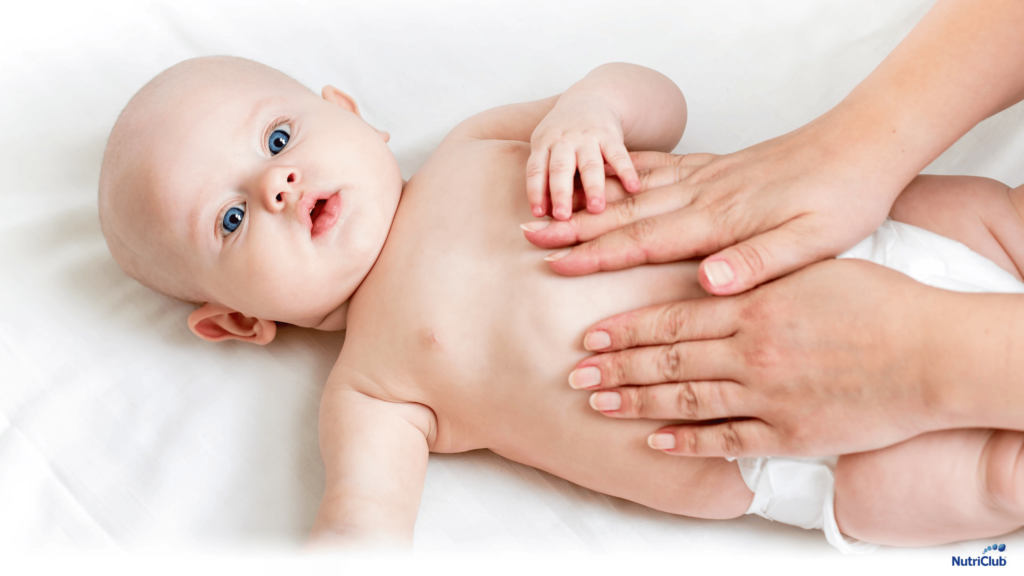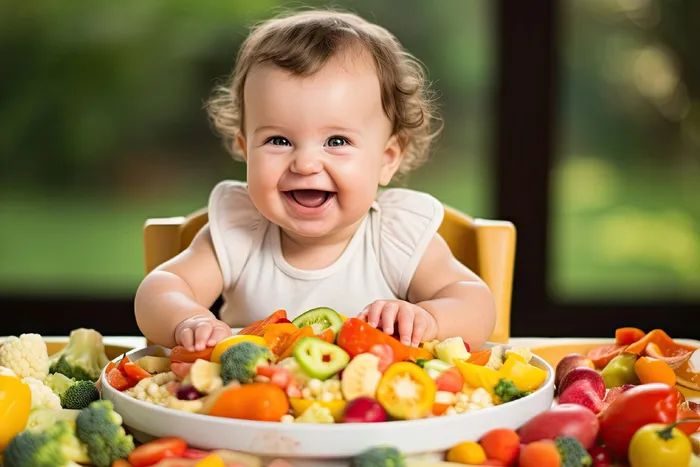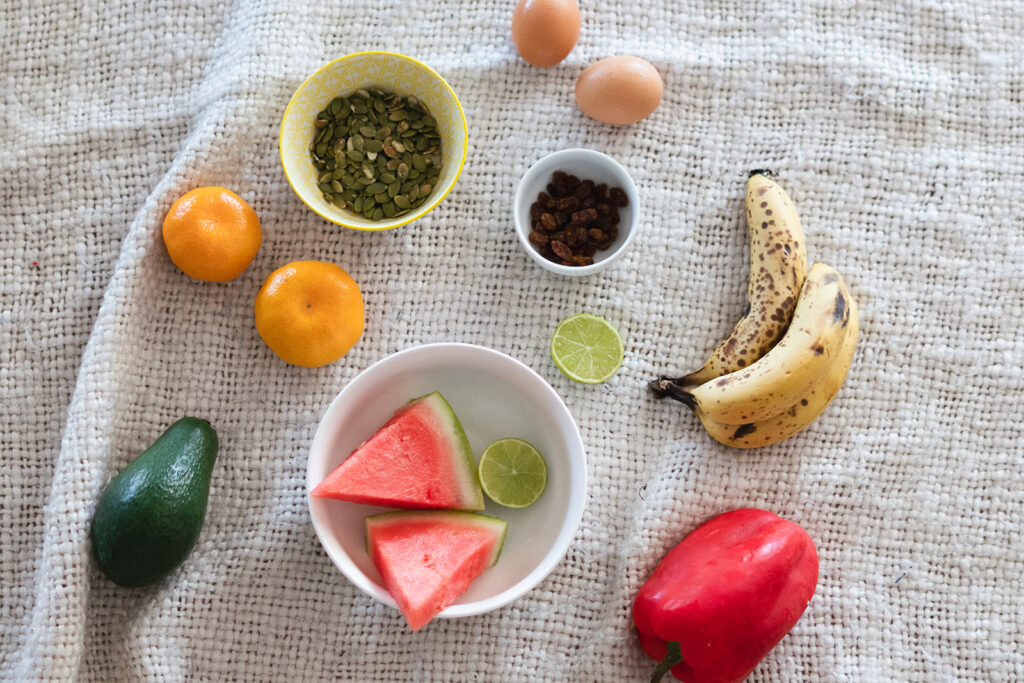I will be sharing some practical tips on how to naturally treat constipation in babies when they begin on solids. You will learn what foods to avoid and include more of to decrease the likelihood of the occurrence of constipation.

As an Amazon Associate I earn from qualifying purchases. If you purchase an Amazon item from the links below, I earn a small commission at no cost to you. Read more about my T&C’s here.
If you are considering beginning your baby on solids or have already begun introducing solids to them, then I recommend waiting until they are 6 months old. Studies have shown that 6 months is an optimal age for introducing solids as that is the age that babies’ digestive systems are mature enough to digest foods.
When babies begin solids, you should expect that their poos will look different in texture and colour (and smell!). Some babies will experience constipation occasionally, while other babies will experience it chronically.
If your baby is experiencing constipation occasionally or chronically, then I hope these tips will be helpful for you in ruling out what could be the cause/s.
What I will cover in this post
- Identifying constipation and possible causes
- Foods to avoid/reduce and include
- Natural remedies for constipation
- Remedies and medications to avoid

Identifying constipation and possible causes
Let’s first define constipation. Constipation is a dry, hard, pebble or pellet-shaped stool that can also be hard to pass.
You may also observe:
- Fewer than three poos a week (ideally once+ a day)
- Smears on nappy from poos that have not been fully released
- Passing excessively foul smelling gas
- A hard and/or distended belly
- Loss of appetite
It is important to note that a baby may grunt or strain in the lead up to a typical bowel movement, but if it is accompanied by a soft ‘normal’ poo, this is not considered to be attributed to constipation.
Let’s now look at some causes of constipation:
A premature digestive system
A baby’s digestive system needs time to properly mature and adapt to the transition of solid foods. This is why starting solids from 6 months of age is an ideal time for when your baby can tolerate solid foods.
Bear in mind that I have a starting solids checklist below that you can download that helps to know when to introduce certain foods to your baby at certain ages before age one (to reduce the risk of an allergic reaction).
Your baby refraining from passing stool
Once your baby begins solids, their poos will be a harder consistency than usual. This may be a reason why some babies refrain from passing stool to avoid this unfamiliar sensation.
Constipating foods (identified below)
When there are too many constipating foods in a baby’s diet, this can contribute to constipation.
Iron-fortified foods
Foods that are artificially fortified with iron can cause constipation, whereas foods with natural sources of iron do not pose the same risk.
Food sensitivity
Constipation can be a sign of a food sensitivity or intolerance. It is important to watch the signs and see if you can identify any particular foods causing the constipation and see a trusted Doctor for testing.
Gut bacteria
The amount and diversity of beneficial bacteria in a baby’s gut influences the rate at which stool moves through their colon.
Formula
Formula can contribute to constipation. Sometimes switching to a more natural brand with authentic ingredients can relieve constipation.
Family history
A family’s history of chronic constipation can increase a baby’s risk of being prone to constipation.
Prematurity
Babies born prematurely are more prone to constipation than babies born at full term.
Illness
When a baby is sick, they are usually eating and drinking less, which can lead to constipation.

Foods to avoid/reduce and include
If your baby is prone to constipation, here are some foods to avoid/reduce:
BRAT foods:
- Banana (unripe)
- Rice: white rice and rice cereal
- Cooked apples and applesauce (cooking apples changes the pectin fibre)
- Toast and all white floured foods
Pasteurised dairy products: dairy foods is one of the leading causes of constipation in babies. Make sure to download my free Starting Solids checklist above so that you can see when the optimal time for introducing dairy to your baby should be.
Iron supplements and fortified iron: these can lead to constipation due to their poor quality ingredients. Look for foods naturally rich in iron like red meat, lentils, eggs, leafy green vegetables etc.
Which foods to include to reduce the likelihood of constipation:
‘P’ fruits or stone fruits:
- Plum
- Prune (most effective)
- Peach
- Pear
- Nectarine
- Mango
- Cherries
- Lychee
Healthy fats: many babies eat steamed or pureed foods which lack fats. Incorporating fats into your baby’s diet like coconut oil, avocado, chia seeds and extra virgin olive oil to name a few, can act as a lube for your baby’s stool.
Liquids: once your baby begins solids, you can serve them little sips of water throughout the day. Drinking more liquid for babies who are prone to constipation may be more beneficial for them. Start with a little and increase liquid intake as they become older.
Chia seeds: these seeds help to draw water into the bowels with their hydrophillic qualities. Mix 1-2 tsp of chia seeds into breastmilk/formula or water. Let it sit until chia seeds are absorbed well in the liquid and serve.
Fennel tea: known to relax muscles in intestines and relieve constipation. Steep one tsp of fennel seeds into one cup of boiling water for at least 30 minutes, then strain. Baby can be offered sips of it throughout the day to aid digestion after meals.
Natural remedies for constipation
If you need to seek extra support for constipation, I would recommend trying some of these natural remedies for constipation before seeking medical advice.
Fermented foods/prebiotics and probiotics supplements: if your baby has started solids, introducing them to a little bit of fermented foods is a great way to influence their gut with beneficial bacteria.
If you need to source a probiotic supplement for digestive and gut support, then click here for my suggested probiotic for babies.
Prebiotics serve as food for the beneficial bacteria in your baby’s gut. Foods rich in prebiotics are garlic, oats, bananas, asparagus, onions and leek. Incorporating these foods into your baby’s diet will help feed the good bacteria and help aid digestion.
Magnesium powder: a baby-friendly magnesium powder is especially helpful in alleviating constipation when it occurs. Magnesium citrate relaxes and draws water into the bowels, making stool softer and easier to pass. Click here for my recommended magnesium citrate powder.
Belly massage: this practice can relax baby’s muscles and ease constipation by loosening the stool. Using warm hands, massage baby’s belly in clockwise motion for a few minutes.
Bicycle legs: this practice helps aid movement in the digestive system. It can also help to relieve gas to help calm upset tummies. Holding baby’s shins, gently press the legs towards their chest and hold for a few seconds. Extend their legs long again and repeat several times. Next, pedal their legs (as if riding a bicycle) and repeat both steps a few times.
Remedies and medications to avoid
The remedies or medications below may cause the following:
Bowel stimulation, over stimulation of the bowels, stomach upset, intestinal cramping, nausea, diarrhea, gas, bloating, electrolyte imbalance, contribution deficiencies and/or may not be suitable for babies.
- Laxatives
- Suppositories
- Stool softeners
- Senna
- Cascara sagrada
- Karo syrup
- Gripe water
- Mineral water
- Miralax
- Colace
- Peri-colace
- Dulcolax
- Lactulose
There may be instances where your doctor will prescribe any of these medications/remedies for your baby. I strongly suggest taking precaution and trying the more natural remedies that I mentioned previously before considering the above.
If you have any questions, feel free to comment below!
More on the blog
Delicious eggless choc chunk cookies
Leave a Reply